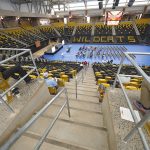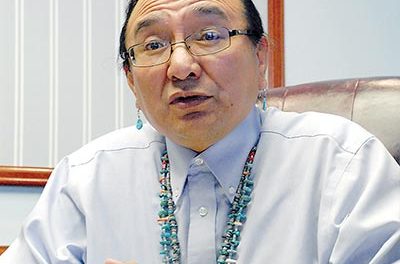
‘Vaccination does not make you bulletproof’: Vaccinated still can spread COVID-19
TÓNANEESDIZÍ
The coronavirus can be transmitted over large gatherings and small get-togethers, such as church and religious events and birthday parties, said Dr. Laura Hammitt.
Hammitt, the director of infectious disease programs at the Center for American Indian Health, said public gatherings and people gathering with family and friends are contributing to community transmission of the virus.
“So we really have to ask people to take a step back,” Hammitt explained during a recent Health, Education, and Human Services Committee meeting. “I know we’re all ready to … move back into normal life, and spending time with loved ones and doing types of activities.
“But with the Delta (variant) being here,” she said, “we really have to ask people to take a step back (and) adhere to the limitations on the size of gatherings.”
Get-togethers do contribute to transmission of the virus, according to public health officials. That’s why the Centers for Disease Control and Prevention warns against gathering with others outside the household.
The strong spread of the Delta variant makes get-togethers more complicated as cases, hospitalizations and deaths are still rising in the Navajo Nation.
The Navajo Department of Health on Sept. 28 reported 37 new COVID-19 cases and no deaths. The Arizona Department of Health Services reported 1,123; Utah Navajo Health System on Sept. 27 reported 1,133 new cases; and the New Mexico Department of Health on Sept. 28 reported 613 new cases.
NDOH recently issued a new health advisory notice for 40 Diné communities because of uncontrolled spread of COVID-19.
President Jonathan Nez said the spread of COVID-19 in the Navajo Nation continues to rise. He urged people to take precautions such as wearing masks, handwashing, and social distancing to slow the spread.
Viruses change over time
Hammitt said viruses, which aren’t technically alive, mutate and evolve as they infect a hosts’ cells and replicate. And the resulting changes to the virus’s genetic code could help it more readily hop between humans or evade the defenses of the immune system.
“All viruses, including SARS-CoV-2, the virus that causes COVID-19, change over time,” Hammitt explained. “When viruses replicate, they don’t always make perfect copies of themselves and sometimes the copies have little mistakes in them or what we call ‘mutations.’”
Scientists and public health experts in recent weeks sounded the alarm about new variants of the coronavirus – such as Mu and Lambda – that carry a handful of tiny mutations, some of which seem to make COVID-19 vaccines less effective.
The coronavirus tends to mix large chunks of its genome when it makes copies of itself, shapeshifting in dangerous ways. Hammitt said these new variants don’t affect how the virus behaves. But that’s not always the case.
“Sometimes, the changes lead to the virus being able to spread more easily or to cause more severe disease or even to resist treatment,” she explained.
“If you think about a virus growing like a tree, each branch on the tree is a little bit different than the others,” she said.
But the Delta variant changed the equation, said Hammitt.
“This variant grows more quickly inside people’s respiratory tracts and to levels that are 1,000 times higher than we were seeing with the earlier strain,” she explained. “Because of this, Delta spreads about two to three times faster than the original version of the virus.
“The conditions that made the coronavirus spread very quickly on the Navajo Nation early in the pandemic are the same conditions that will contribute to this virus spreading rapidly now,” she said, “especially given that the (Delta) variant itself is more contagious.”
NDOH on Sept. 28 reported 406 cases of Delta; 156 cases of Alpha; 142 cases of the Delta/Epsilon; eight of the Gamma; six of the Beta/Gamma; and none of the Beta on the Navajo Nation.
Del Yazzie, director of the Navajo Epidemiology Center, said the Delta/Epsilon and the Beta/Gamma are difficult to distinguish. And because they are difficult to distinguish, COVID-19 tests are sent to TGen – the Translational Genomics Research Institute – in Flagstaff, to identify the variant.
“A lot of the drivers of transmission is due to off-the-Nation travel, faith-based events,” Yazzie said. “Also, family gatherings, birthday parties, and other family-related events.
“These are the three main drivers of transmission as far as we know of today,” he said.
Yazzie added, “Cases are high. Our cases continue to be going up, likely driven by the Delta variant. Our test positivity has been increasing over time and hospitalization is increasing as well.”
COVID-19 vaccines
The COVID-19 vaccines are intended to prevent hospitalization and death, severe infection and damage to the lungs and other organs.
But research shows that vaccinated people infected with the Delta variant carry great amounts of the virus in the nose and throat, according to the CDC.
This means that people with “breakthrough” infections – or cases that happen even though a person is fully vaccinated – may be just as contagious as unvaccinated people.
“Anyone who’s unvaccinated is at serious risk of getting sick from the Delta variant,” Hammitt said. “It is, however, possible for vaccinated people to spread the Delta variant if they do get infected.
“So we really need everyone, including people who are vaccinated to wear masks, stay home when sick, avoid large gatherings, and get tested if there are symptoms,” she said.
Hammit said if there is an uncontrolled spread of the SARS-CoV-2, there will be more coronavirus variants in the future.
“I recognize how exhausting this is, and we all want to be done with this virus but unfortunately, the virus is not done with us,” Hammitt said. “Understand that vaccination does not make you bulletproof.
“And if you have people who are unvaccinated around you, you really need to continue to take precautions,” she said. “Every single person in the community who gets vaccinated is helping not only to protect themselves and the community, but (they) are also helping to keep hospitals from filling up with COVID-19 patients.”
As a public service, the Navajo Times is making all coverage of the coronavirus pandemic fully available on its website. Please support the Times by subscribing.
How to protect yourself and others.
Why masks work. Which masks are best.
Resources for coronavirus assistance







 Highway 264,
Highway 264, I-40, WB @ Winslow
I-40, WB @ Winslow